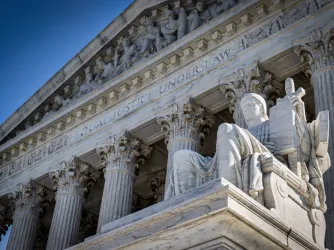Table of Contents
FIRE releases statement on free speech and social media

Antlii / Shutterstock.com
Over the last two decades, people have increasingly flocked to social media to have conversations about politics, current events, and other topics of human interest. For better or worse, the vibrancy of free speech culture partly depends on what speech large and influential private platforms like Twitter and Facebook think is acceptable. For that reason, we should all be concerned when these platforms regulate users’ speech based on vague, arbitrary, or viewpoint-discriminatory standards.
But while we can — and must — vigorously advocate for social media policies and practices that promote free expression, we should also oppose laws that infringe upon platforms’ First Amendment right to make editorial decisions about the content they host. That’s the position FIRE takes in our new statement on free speech and social media.
FIRE isn’t just an advocate for First Amendment rights. We also want to see the principles underlying the First Amendment reflected in our culture and institutions. FIRE Executive Vice President Nico Perrino recently explained what we mean when we talk about promoting a “free speech culture”:
Free speech culture is a set of norms that support free thought and our ability to share our opinions. These are norms that see value in curiosity, dissent, devil’s advocacy, thought experimentation, and talking across lines of difference; where our first instinct in response to speech we dislike isn’t to find a way to censor it — or “cancel” the speaker — but to meet it with more speech. To defeat ideas we oppose with better ones.
We’ve seen social media companies fail to live up to these ideals. The “Twitter Files,” for example, have exposed instances of overzealous and arbitrary content moderation under Twitter’s past management — sometimes under the influence of government actors — which FIRE has strongly criticized. Twitter’s current ownership also has a spotty record on free speech, despite declaring it a priority. Social media free speech failures are especially concerning given that a handful of platforms have an outsized role in the online speech marketplace, giving them power to shape public discussions about important issues.
Solutions that reduce the scope and power of the First Amendment are likely to be no solutions at all.
At the same time, FIRE is disturbed by increased calls to use coercive state power to force or pressure private social media companies to censor. Bad laws are already on the books. FIRE is suing the state of New York to challenge its unconstitutional law requiring social media networks to address speech that could “vilify” or “humiliate” people based on protected class (such as race, gender, or religion).
Meanwhile, Texas and Florida have enacted laws that require platforms to host content they may wish to restrict. These laws are the wrong response to legitimate concerns about Big Tech censorship.
In Netchoice, LLC v. Moody, the U.S. Court of Appeals for the Eleventh Circuit held that the forced-hosting provision in Florida’s law likely violates the First Amendment. But a divided Fifth Circuit panel rejected a constitutional challenge to a similar Texas law in NetChoice, L.L.C. v. Paxton. FIRE’s statement analyzes these decisions in some depth, as supporters of the Florida and Texas laws claim they actually advance free expression — and the Supreme Court may soon decide to weigh in.
Bottom line: The Eleventh Circuit got it right.
That court correctly recognized that when social media platforms voluntarily remove posts — and use algorithms and other means to curate content and drive engagement — they “exercise editorial judgment that is inherently expressive,” similar to newspapers, cable operators, or parade organizers. The First Amendment protects both a private actor publishing content the government wishes to suppress, and a private actor refusing to publish speech that the government wants them to host.
Our statement addresses and rejects, among other arguments, the reasoning for regulating social media platforms as common carriers that must treat all users’ viewpoints equally. We are more sympathetic to regulating certain non-expressive online infrastructure and intermediaries — internet service providers, web hosting services, content delivery networks, domain registrars, payment processors, and the like. But the government cannot and should not dictate private, inherently expressive platforms’ decisions about what speech to host, even for the ostensible purpose of leveling the expressive playing field.

Free Speech and Social Media
Social media companies wield immense power to shape and inform important national debate. But some have gone too far in regulating the speech of their users. Here's what you need to know.
The First Amendment recognizes the danger of endowing the government with that authority. It constrains government because its sovereign power presents an exceptional threat to freedom of speech. As our statement explains:
However imperfectly our society’s marketplace of ideas may function, the last century of First Amendment jurisprudence reflects a considered judgment that government intrusion into that marketplace generally leads to worse, not better, outcomes for free expression. The wisdom of that position has held true through more than one revolution in communication technology that radically altered the landscape of human expression. We should not so quickly assume it will not survive another.
Our statement also describes how weakening First Amendment protection for social media platforms could have disastrous downstream consequences for other internet forums and speech-hosting websites that curate content or moderate discussions. Subreddits, Quora spaces, Discord channels, Wikipedia, blog comment sections — even offline establishments that selectively distribute others’s speech, like bookstores and movie theaters — are vulnerable under the Paxton majority’s logic, which recasts the constitutionally protected exercise of editorial discretion as unprotected censorship.
Our statement concludes with some thoughts on how to promote free expression on social media without violating the First Amendment rights of either platforms or potentially other private speakers:
- Platforms should borrow wisdom from First Amendment law, the longest-sustained meditation on how to protect free speech; eliminate policies and practices that single out specific political or ideological viewpoints for censorship; and create narrow and clearly defined categories of sanctionable speech.
- FIRE will develop a rating system for major social media companies based on the extent to which they restrict speech, to inform users of the bargains they enter when engaging with each platform, and to ensure each platform is aware that their fidelity to free speech principles is being monitored and reported.
- FIRE will also advocate for due process and greater transparency in how social media companies moderate speech on their platforms, cognizant that certain government-mandated disclosures can also raise First Amendment issues.
- Arguments for decentralization have gained traction. Moving away from centrally controlled platforms to decentralized social media networks could give users more control over their experience and make the online speech environment less dependent on the whims and preferences of a few powerful tech executives.
- To the extent we look to the government for answers, we should limit our options to speech-agnostic structural reforms, including antitrust laws, facilitating interoperability (allowing users to share content across platforms), and other steps to increase competition in the industry.
Twelve years ago, the Supreme Court observed that “whatever the challenges of applying the Constitution to ever-advancing technology, the basic principles of freedom of speech and the press, like the First Amendment’s command, do not vary when a new and different medium for communication appears.” Unless and until proven ineffective, we should advocate voluntary measures by social media platforms and structural reforms to bolster free speech culture online.
We must speak out against social media platforms’ arbitrary and viewpoint-discriminatory speech policing. But we must also remember that solutions that reduce the scope and power of the First Amendment are likely to be no solutions at all.
Read FIRE’s full statement.
Recent Articles
Get the latest free speech news and analysis from FIRE.

The federal charges against Don Lemon raise serious concerns for press freedom

The American people fact-checked their government

California prohibits its teachers from talking about a student's gender identity to their parents. That raises First Amendment concerns.


